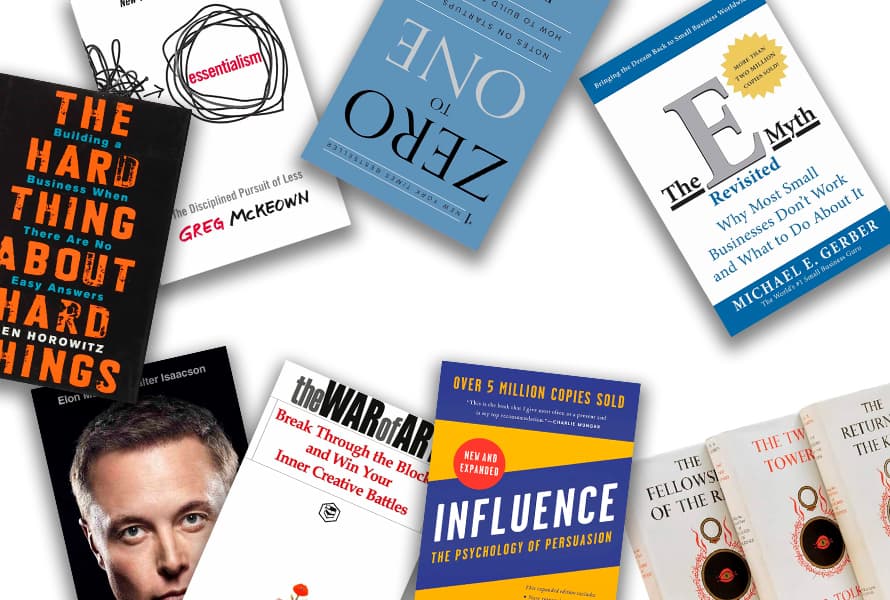Zero to One by Peter Thiel
This classic is written by Peter Thiel, a founder of companies such as PayPal and Palantir, and one of the earliest investors in Facebook. The book emphasizes the folly of competition in business and the power of seeking unconventional wisdom. Thiel's view is that all competition is for losers.
"All failed companies are alike: they've not escaped competition. All successful companies are different."
If you're a startup founder, according to Thiel, you should aim for a very small market where you can become a monopoly. He challenges readers with the question: "What do you believe to be true that very few people agree with you on?"
The Hard Thing About Hard Things by Ben Horowitz
This book offers an immersive experience, showing you what running a successful startup is actually like. It's not just sunshine and rainbows, but involves huge amounts of pain and seemingly unresolvable problems. If you're curious about what being a CEO is really like, you should read it. While it contains some team-management tips that may be more useful for those who already have a team, the overall insights are invaluable for aspiring founders.
The War of Art by Steven Pressfield
Being an entrepreneur is always a struggle. Starting work when you don't want to, reaching out to clients, having difficult conversations, and showing up every day can be challenging. This book is about the resistance we all experience and how to overcome it.
Influence by Robert Cialdini
This book explores the cognitive biases we all have and how others can try to manipulate us, knowingly or unknowingly. Charlie Munger, one of the most successful investors of all time and Warren Buffett's partner, lists this book as one of his all-time favorites. He even gifted Cialdini shares of Berkshire Hathaway worth millions of dollars as a sign of appreciation for the book. Cialdini also has two newer books on the same theme: "Pre-Suasion" and "Yes!: 50 Scientifically Proven Ways to Be Persuasive", which are worth reading if you enjoyed "Influence."
Essentialism by Greg McKeown
In a world full of distractions, where everything and everyone wants to snatch your attention, cutting out non-essential things is crucial for success. Even Alexander Usyk, the first Undisputed Heavyweight Boxing Champion in 20 years, was reading this book on his way to fight for the title against Tyson Fury.
The book makes a strong case for having LESS to do, rather than being constantly busy with various projects. As an entrepreneur, you'll likely struggle with "Shiny Object Syndrome," where every opportunity seems lucrative, leading to a lack of progress. The book's cover emphasizes the importance of being directional with your efforts and not diverting your attention from what really matters.
The Lord of the Rings by J.R.R. Tolkien
An odd choice, perhaps, until you discover that Peter Thiel named his companies after elements from the book, Elon Musk considers it his all-time favorite, and many Silicon Valley figures have a deep appreciation for Tolkien. Why? Because the story is relatable to entrepreneurs. Entrepreneurship, particularly in start-ups, is a dangerous and dark journey full of risks, undertaken in small groups of like-minded people. The standard route of reading Lord of the Rings is to start with The Hobbit, then continue with the trilogy: The Fellowship Of The Ring, The Two Towers, and The Return of the King. I'm on the second book right now, and so far - I like it a lot! The rich language of Tolkien, the world building and storytelling make these books a pleasure to read.
Elon Musk by Walter Isaacson
This biography offers a great glimpse into the life of one of the most important figures of our century. Particularly interesting are the interactions between Musk and other tech giants like Bill Gates and Tim Cook. It's a comprehensive book on Musk's life from childhood to 2023, and a fascinating read. Entrepreneurs should read biographies like this to ignite their passion and learn from others' experiences.
The E-Myth Revisited by Michael E. Gerber
The E-Myth Revisited emphasizes that entrepreneurs should not only work IN the business but also (and primarily) ON the business. Many people treat their startups like a 9-to-5 job, without thinking about leverage points, hiring, automation, or unique opportunities. This approach leads nowhere. The book stresses the need to think deeply about your business, as hard work alone is not enough for success.



